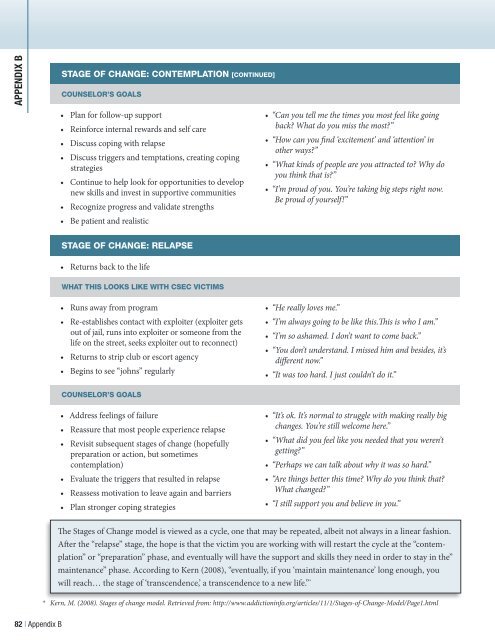Ending the Commercial Sexual Exploitation of Children - California ...
Ending the Commercial Sexual Exploitation of Children - California ...
Ending the Commercial Sexual Exploitation of Children - California ...
Create successful ePaper yourself
Turn your PDF publications into a flip-book with our unique Google optimized e-Paper software.
APPENDIX BStage <strong>of</strong> Change: Contemplation [continued]Counselor’s Goals• Plan for follow-up support• Reinforce internal rewards and self care• Discuss coping with relapse• Discuss triggers and temptations, creating copingstrategies• Continue to help look for opportunities to developnew skills and invest in supportive communities• Recognize progress and validate strengths• Be patient and realistic• “Can you tell me <strong>the</strong> times you most feel like goingback? What do you miss <strong>the</strong> most?”• “How can you find ‘excitement’ and ‘attention’ ino<strong>the</strong>r ways?”• “What kinds <strong>of</strong> people are you attracted to? Why doyou think that is?”• “I’m proud <strong>of</strong> you. You’re taking big steps right now.Be proud <strong>of</strong> yourself!”Stage <strong>of</strong> Change: relapse• Returns back to <strong>the</strong> lifeWhat This Looks Like with CSEC Victims• Runs away from program• Re-establishes contact with exploiter (exploiter getsout <strong>of</strong> jail, runs into exploiter or someone from <strong>the</strong>life on <strong>the</strong> street, seeks exploiter out to reconnect)• Returns to strip club or escort agency• Begins to see “johns” regularly• “He really loves me.”• “I’m always going to be like this.This is who I am.”• “I’m so ashamed. I don’t want to come back.”• “You don’t understand. I missed him and besides, it’sdifferent now.”• “It was too hard. I just couldn’t do it.”Counselor’s Goals• Address feelings <strong>of</strong> failure• Reassure that most people experience relapse• Revisit subsequent stages <strong>of</strong> change (hopefullypreparation or action, but sometimescontemplation)• Evaluate <strong>the</strong> triggers that resulted in relapse• Reassess motivation to leave again and barriers• Plan stronger coping strategies• “It’s ok. It’s normal to struggle with making really bigchanges. You’re still welcome here.”• “What did you feel like you needed that you weren’tgetting?”• “Perhaps we can talk about why it was so hard.”• “Are things better this time? Why do you think that?What changed?”• “I still support you and believe in you.”The Stages <strong>of</strong> Change model is viewed as a cycle, one that may be repeated, albeit not always in a linear fashion.After <strong>the</strong> “relapse” stage, <strong>the</strong> hope is that <strong>the</strong> victim you are working with will restart <strong>the</strong> cycle at <strong>the</strong> “contemplation”or “preparation” phase, and eventually will have <strong>the</strong> support and skills <strong>the</strong>y need in order to stay in <strong>the</strong>”maintenance” phase. According to Kern (2008), “eventually, if you ‘maintain maintenance’ long enough, youwill reach… <strong>the</strong> stage <strong>of</strong> ‘transcendence,’ a transcendence to a new life.” ** Kern, M. (2008). Stages <strong>of</strong> change model. Retrieved from: http://www.addictioninfo.org/articles/11/1/Stages-<strong>of</strong>-Change-Model/Page1.html82 | Appendix B



